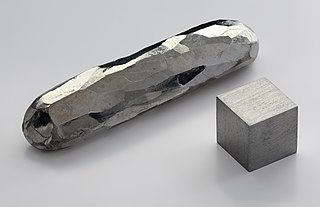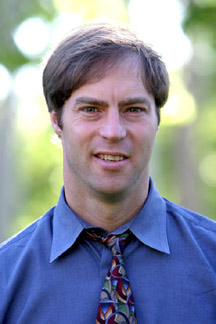Related Research Articles

Cadmium is a chemical element with the symbol Cd and atomic number 48. This soft, silvery-white metal is chemically similar to the two other stable metals in group 12, zinc and mercury. Like zinc, it demonstrates oxidation state +2 in most of its compounds, and like mercury, it has a lower melting point than the transition metals in groups 3 through 11. Cadmium and its congeners in group 12 are often not considered transition metals, in that they do not have partly filled d or f electron shells in the elemental or common oxidation states. The average concentration of cadmium in Earth's crust is between 0.1 and 0.5 parts per million (ppm). It was discovered in 1817 simultaneously by Stromeyer and Hermann, both in Germany, as an impurity in zinc carbonate.

Michael Joseph Behe is an American biochemist and an advocate of the pseudoscientific principle of intelligent design (ID). He serves as professor of biochemistry at Lehigh University in Pennsylvania and as a senior fellow of the Discovery Institute's Center for Science and Culture. Behe advocates for the validity of the argument for irreducible complexity (IC), which claims that some biochemical structures are too complex to be explained by known evolutionary mechanisms and are therefore probably the result of intelligent design. Behe has testified in several court cases related to intelligent design, including the court case Kitzmiller v. Dover Area School District where his views were cited in the ruling that intelligent design is not science and is religious in nature.

Christian René Marie Joseph, Viscount de Duve was a Nobel Prize-winning Belgian cytologist and biochemist. He made serendipitous discoveries of two cell organelles, peroxisome and lysosome, for which he shared the Nobel Prize in Physiology or Medicine in 1974 with Albert Claude and George E. Palade. In addition to peroxisome and lysosome, he invented scientific names such as autophagy, endocytosis, and exocytosis in a single occasion.

The genus Glycera is a group of polychaetes commonly known as bloodworms. They are typically found on the bottom of shallow marine waters, and some species can grow up to 35 cm (14 in) in length.
Icons of Evolution is a book by Jonathan Wells, an advocate of the pseudoscientific intelligent design argument for the existence of God and fellow of the Discovery Institute, in which Wells criticizes the paradigm of evolution by attacking how it is taught. The book includes a 2002 video companion. In 2000, Wells summarized the book's contents in an article in the American Spectator. Several of the scientists whose work is sourced in the book have written rebuttals to Wells, stating that they were quoted out of context, that their work has been misrepresented, or that it does not imply Wells's conclusions.

The Center for Science and Culture (CSC), formerly known as the Center for the Renewal of Science and Culture (CRSC), is part of the Discovery Institute (DI), a conservative Christian think tank in the United States. The CSC lobbies for the inclusion of creationism in the form of intelligent design (ID) in public-school science curricula as an explanation for the origins of life and the universe while trying to cast doubt on the theory of evolution. These positions have been rejected by the scientific community, which identifies intelligent design as pseudoscientific neo-creationism, whereas the theory of evolution is overwhelmingly accepted as a matter of scientific consensus.

The intelligent design movement is a neo-creationist religious campaign for broad social, academic and political change to promote and support the pseudoscientific idea of intelligent design (ID), which asserts that "certain features of the universe and of living things are best explained by an intelligent cause, not an undirected process such as natural selection." Its chief activities are a campaign to promote public awareness of this concept, the lobbying of policymakers to include its teaching in high school science classes, and legal action, either to defend such teaching or to remove barriers otherwise preventing it. The movement arose out of the creation science movement in the United States, and is driven by a small group of proponents.

Stephen C. Meyer is an American author and former educator. He is an advocate of the pseudoscience of intelligent design and helped found the Center for Science and Culture (CSC) of the Discovery Institute (DI), which is the main organization behind the intelligent design movement. Before joining the DI, Meyer was a professor at Whitworth College. Meyer is a senior fellow of the DI and director of the CSC.

The Wedge Strategy is a creationist political and social action plan authored by the Discovery Institute, the hub of the pseudoscientific intelligent design movement. The strategy was put forth in a Discovery Institute manifesto known as the Wedge Document. Its goal is to change American culture by shaping public policy to reflect politically conservative fundamentalist evangelical Protestant values. The wedge metaphor is attributed to Phillip E. Johnson and depicts a metal wedge splitting a log.

The "teach the controversy" campaign of the Discovery Institute seeks to promote the pseudoscientific principle of intelligent design as part of its attempts to discredit the teaching of evolution in United States public high school science courses. Scientific organizations point out that the institute claims that there is a scientific controversy where in fact none exists.
Paul R. Gross is a biologist and author, perhaps best known to the general public for Higher Superstition (1994), written with Norman Levitt. Gross is the University Professor of Life Sciences (Emeritus) at the University of Virginia; he previously served the university as Provost and vice-president. He has written widely on biology, evolution and creationism, and the intellectual conflicts of the Science wars—for example, his book Creationism's Trojan Horse: The Wedge of Intelligent Design (2004), written with Barbara Forrest.

Evolution: A Theory in Crisis is a 1985 book by Michael Denton, in which the author argues that the scientific theory of evolution by natural selection is a "theory in crisis". Reviews by scientists say that the book distorts and misrepresents evolutionary theory and contains numerous errors.
Comparative physiology is a subdiscipline of physiology that studies and exploits the diversity of functional characteristics of various kinds of organisms. It is closely related to evolutionary physiology and environmental physiology. Many universities offer undergraduate courses that cover comparative aspects of animal physiology. According to Clifford Ladd Prosser, "Comparative Physiology is not so much a defined discipline as a viewpoint, a philosophy."

The Discovery Institute has conducted a series of related public relations campaigns which seek to promote intelligent design while attempting to discredit evolutionary biology, which the Institute terms "Darwinism." The Discovery Institute promotes the pseudoscientific intelligent design movement and is represented by Creative Response Concepts, a public relations firm.
Marcus R. Ross is an American young earth creationist and vertebrate paleontologist. Ross was featured in a February 2007 New York Times article about the conflict between his young Earth creationist beliefs and his doctoral dissertation. His dissertation was on tracking the diversity, biostratigraphy, and extinction of mosasaurs, an extinct group of marine reptiles whose remains are found in Late Cretaceous period deposits around the world.

Michael Alan Rice, is an American professor of fisheries and aquaculture at the University of Rhode Island and former state representative from South Kingstown, Rhode Island. A Democrat, he served in the Rhode Island House of Representatives, representing the 35th district, encompassing the village of Kingston and West Kingston, and parts of the neighborhoods of Tuckertown, Wakefield and Peace Dale. Rice was first elected on November 4, 2008, and served from January 3, 2009, to January 3, 2011.

Grover Cleveland Stephens, Jr., was an American marine biologist and comparative physiologist at the University of Minnesota and the University of California, Irvine.
Donal Thomas Manahan is an Irish-born American marine scientist and comparative physiologist. He is known for Antarctic and deep oceanic research on the physiology and ecology of marine invertebrates and their larvae in extreme environments, and for his interest in the role of dissolved organic material as a larval food source.
Patricia Ann Wheeler is a retired American phycologist and oceanographer. She is known for her work physiology and ecology of marine phytoplankton and primary production in marine ecosystems.
Stephen Henry Wright is an American physiologist. He is primarily known for his work on the mechanisms of organic solute transport in kidney tubules, but he is also known for work to describe transport of organic solutes across epithelial membranes by marine invertebrates.
References
- 1 2 3 4 "Paul Chien, Senior Fellow - CSC". Discovery Institute. 2008. Archived from the original on 2009-04-17. Retrieved 2008-05-17.
- ↑ "Paul K. Chien". Goodreads.com. Retrieved 21 Nov 2011.
- ↑ Faculty Biography Archived 2010-05-29 at the Wayback Machine , University of San Francisco. Accessed 29 October 2010.
- ↑ Wedge document
- ↑ Forrest, Barbara; Paul R. Gross (January 8, 2004). Creationism's Trojan Horse: The Wedge of Intelligent Design. Oxford University Press. pp. 62–63. ISBN 978-0-19-515742-0.